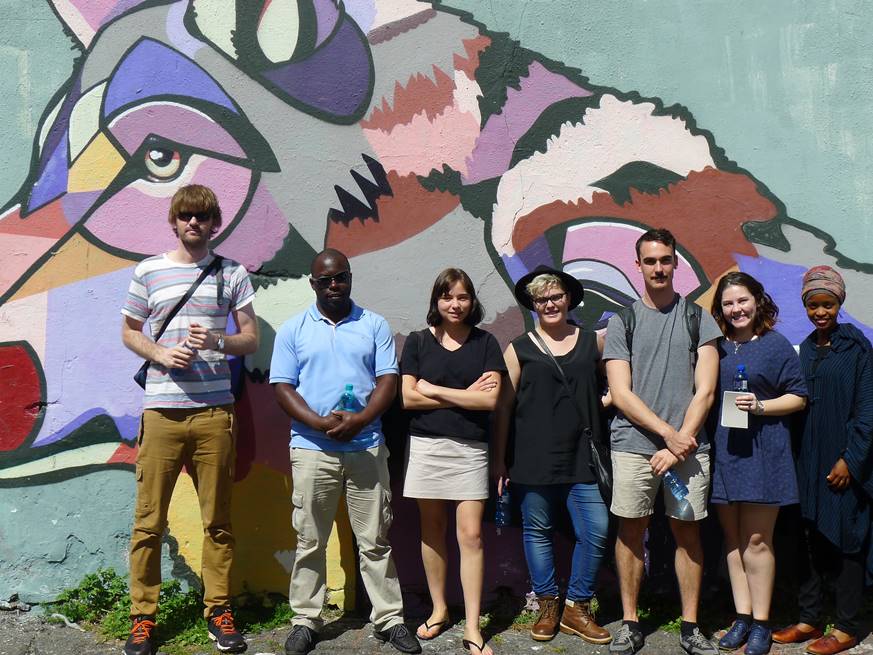The Department of English Studies works with local and international texts in English, and offers elective courses in literary, film and cultural studies, and creative writing.
For more than three centuries, the Cape has served as a passageway linking West and East, North and South. This conjunction of the local and the global, of time and place, consciously informs our goals in the Department of English Studies at Stellenbosch University. In our teaching and research, we ask how – and why – modes of reading, representation and textuality are variously constituted in different times and locales, and to different communities.
We define our discipline by the transformative encounters between worlds and words, a process of reading, thinking, debate and writing which is well-placed to contribute not only to our students’ critical and creative knowledge of the field, but also to the possibilities for change in Stellenbosch, a site still marked by racial and economic disparity. If novels by Akwaeke Emezi and Abdulrazak Gurnah, poetry from the Caribbean, and articles by Njabulo S. Ndebele can revise racial, cultural and gendered identities, so too can fiction by Olive Schreiner or poetry by Walt Whitman open us to alternate points of view about the relation between identity and ideology, the global south and the demands of locality. Our research areas (among them queer theory, critical nature studies, diaspora studies, life writing, visual activism, the Neo-Victorian and contemporary poetry) contribute to our ability to position ‘English’ as a space of expression which explores a wide range of thought, representation and agency. We aim to equip our graduates with conceptual and compositional tools central to careers in media, education, NGOs, law, and the public service. Simultaneously, we recognize that critical thinking skills are not simply instrumental, but play an important role in democracy and transformation.
In the English Department, we encourage a collegial, inclusive research community in which all participants (staff, postgraduates and undergrads, fellows, professors extraordinaire and emeriti) are enabled to produce original and innovative scholarship. To this end, there is a programme of regular events in the department, among them research seminars featuring regional and international speakers; workshops on research methods, proposal writing, and creative writing. We host a number of active reading and writing groups, of which the Nature Critical: Environmental Humanities Reading Group is one.
The undergraduate core courses range widely over different periods, genres and localities, providing instruction in traditional areas of English literary studies as well as in postcolonial literary studies and cultural studies. Through its emphasis on small-group teaching in our third-year seminars, our curriculum allows students to curate their studies according to their own interests and needs. At third year and Honours level, we offer the opportunity to engage with and learn from students from the U.K. and India via our hybrid learning initiatives.
The intensive Honours course both consolidates the work done at undergraduate level with a compulsory theory course in twentieth century thought pertinent to literary and cultural studies, and a compulsory long research essay that prepares the ground for study at Masters level. Here staff teach in their areas of research and students choose from a range of topics as diverse as nineteenth century studies, contemporary East African studies, literary practices, narrative theory, ecocriticism, biographical studies and love in the global south.
Over the last few years we have recruited a large and diverse body of masters and doctoral students from scattered geographies who work more often than not with a supervisory team, and also participate in our research seminar programme as well as in courses offered in the African Doctoral Academy and in a number of reading groups organised by staff. Staff and postgraduate students are active in a number of Departmental projects such as our NIHSS funded study with DR BMN College and SNDT University, Mumbai, ‘South-South Feminisms’. These transnational conversations have brought a new dynamic to our work and expanded our knowledges.
Our fifteen full-time members of staff and eleven first year and five second year tutors (who are both postgraduate students and fully- qualified academics with doctorates) are committed to the value of the critical imagination, of hard work and conviviality in the Department. We have, we believe, a vibrant and supportive place of study and of personal growth in an institution that is attempting to re-invent itself.

